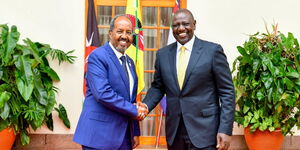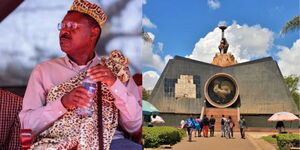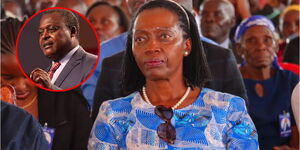Kenya's economy is likely to continue enjoying price stability on key imports such as fuel and consumer goods, following projections that the shilling will remain strong.
The development came due to a dollar buying spree that has pushed the country's foreign exchange reserves to a record high.
The Central Bank of Kenya (CBK) had Ksh1.33 trillion (USD10.3 billion) as of May 8, surpassing the regional bloc's minimum target of four and a half months of import cover, according to the CBK's weekly bulletin published on Friday.
"The usable foreign exchange reserves remained adequate at USD 10,291 million (4.6 months of import cover) as of May 8, 2025. This meets the CBK’s statutory requirement to endeavour to maintain at least 4 months of import cover," read part of CBK's bulletin.
According to Bloomberg, cash inflows from exports, remittances, and a Ksh64.5 billion (USD500 million) loan from Abu Dhabi and proceeds from a Eurobond also boosted Kenya's coffers.
In addition to these buffers, lower oil prices have helped "reduce Kenya’s external funding needs and will support the shilling," Patrick Curran, a senior economist at Tellimer Ltd, told Bloomberg.
Further, according to CBK, commercial banks’ excess reserves stood at Ksh14.3 billion in relation to the 3.25 per cent cash reserves requirement (CRR).
The shilling has traded at about Ksh129 per dollar for the past nine months and has maintained the steady path even as other major world currencies stumbled.
Earlier, there were fears that the US President Donald Trump’s tariff turmoil could have an impact on the shilling.
However, experts maintain that the shilling will likely continue on the stability path, thanks to the CBK's solid foreign reserves.
''As long as the central bank can continue to build foreign-exchange reserves, as it has been able to do since mid-2024, there will likely be ongoing shilling stability around current levels of 129,'' Citigroup Inc. strategists Luis Costa and Katie Kironde wrote in a note.
More inflows from an expected Ksh77.4 billion (USD600 million) World Bank loan and Ksh34.2 billion (USD265 million) from the African Development Bank are expected to continue strengthening reserves and the financial buffers.
Despite the improvement in the external liquidity, experts still maintain that the CBK should continue undertaking concrete fiscal measures to set the public debt on a sustainable path over the long term.












